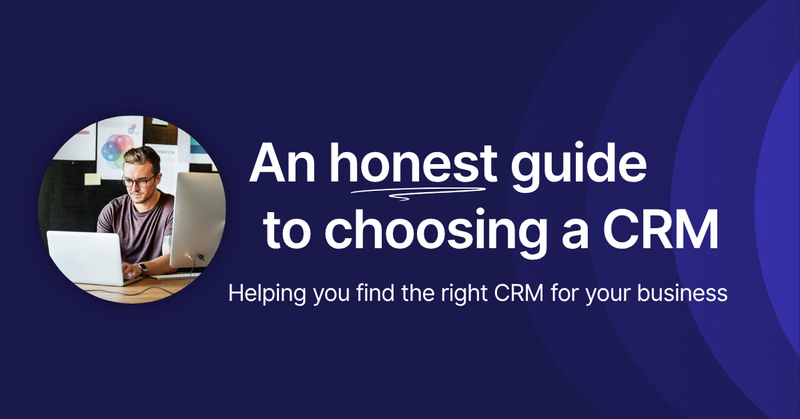Enough tech jargon. Who has time to read up on the specs of every feature when you’ve got 1001 tasks to do? Today, we’ll help you choose a CRM that suits your actual business needs, based primarily on two factors: your business size and the complexity of your processes.
Here are all the questions you need to ask yourself.
1. What job(s) do I need a CRM to do?
Most CRMs are overbuilt for early-stage needs and underdeliver once you scale - or they limit your growth. If you need simple contact tracking today but want pipeline management or automation later, your choice should support both without heavy upgrades.
Asking this question:
- Prioritizes your actual use cases.
- Prevents overpaying for unused features.
- Avoids having to migrate between CRMs in future.
Use case examples
- Most small businesses just need a simple system to track leads and log calls/emails. A lightweight CRM like Capsule, HubSpot (free tier), or Pipedrive might be ideal.
- Scaling SaaS company: Needs sales automation, pipeline forecasting, and customer lifecycle tracking. Might need Salesforce, HubSpot Pro, or Zoho CRM.
- Service business (e.g. agency): May need task/project linkage, proposal tools, or client communication tracking — consider Insightly, Nimble, or Keap.
Director of The Ops Department, Karen Espley, is often asked which CRM she recommends: her first question is “What do you want to use a CRM to accomplish?”.

Remember, most CRMs are designed to solve specific pain points. So what are yours?
Some common needs:
- “I need to stay on top of follow-ups” - Look for CRMs with reminders and a simple sales pipeline.
- “We’re growing fast and losing track of contacts” - Prioritize contact management functionality and visibility for your team.
- “We want to launch campaigns” - You may want to prioritize a platform with built-in email tools or native integrations with marketing platforms.
How business size and complexity factor in
- Smaller teams need a fast setup and minimal tools that help them manage their core responsibilities.
- Larger or growing teams should choose a CRM that supports their current and growing responsibilities, without requiring a platform migration.
If you’re a solo founder or small team, your needs may be lightweight: managing leads, sending follow-ups, tracking conversations. But if you're growing quickly, you might soon need deal tracking, marketing automation, or multi-stage workflows.
- Now: You want to track who you've emailed and when to follow up.
- Later: You want automated email sequences, lead scoring, or task routing to reps.
Ask yourself where do you see your company in 12 months time? Do you have specific ambitions to scale quickly, or grow steadily? This can influence your thinking in what you need now and what you will need later.
Just as importantly, you need to ask yourself, “What don’t I need?” If you’re not doing deep data analysis or running multi-stage workflows across teams, then an enterprise-level CRM will be a well-dressed money pit.
2. Who’s going to use it (and will they actually use it)?
The best CRM is the one your team actually uses. Fancy features mean nothing if the interface is confusing or onboarding is painful.
By asking this question
- Finding the tools with a strong user experience and adoption support becomes easier.
- You filter out "power-user" tools when what you really need is simplicity.
- It becomes clear if CRMs with excellent mobile or integrations are relevant.
Does everyone in your company need access to your CRM? Will the people using your CRM make use of all of its features? Beyond that, are your team familiar with CRM software or sufficiently tech-savvy to adopt one with little friction?
Jaanika Okk, Founder of Time Assist, highlights an often overlooked factor.

If your company only requires a few seats, an enterprise-level CRM like HubSpot, SalesForce, or Microsoft Dynamics 365 is probably surplus to your needs.
These CRMs offer advanced tools such as reporting, which are likely to go unused in a small company, especially if your colleagues aren’t comfortable working with data and technology.Salesforce
Once you’ve reduced your CRM options to a shortlist, it may be worth calling in colleagues who will spend a lot of time using it: they can advise on what they really need, what works for them, and what’s missing.
If it’s just you, reflect on your own experiences with other tools you’ve used in the past, jot down what you like and dislike about your experience with using them, and use that to help inform your decision.
How business size and complexity factor in
- Small teams: Look for quick setup, minimal training, and intuitive UX.
- Larger teams: You’ll need a platform that offers role-based permissions, customizable views, and training support.
- Mixed-tech comfort levels: Choose CRMs with onboarding support, templates, or built-in tutorials.
3. What other tools do I already use that this CRM needs to work with?
Integration is often more valuable than features. A mid-range CRM that syncs seamlessly with your email, calendar, helpdesk, or accounting tools might outperform a feature-rich one that’s isolated.
Answering this question
- Helps you prioritize CRMs with native or Zapier integrations.
- Can help refocus around the tools and support your team or business relies on.
- Could save you money and time spent adopting a CRM.
Why it matters:
A CRM doesn't live in a vacuum. It must sync with the rest of your stack (email, calendar, support desk, billing, marketing). The more seamless the integration, the more powerful and less frustrating your workflow will be.
Use case examples:
- If you use Gmail or Outlook, look for a CRM with a native email integration.
- If your business works with Slack, Teams, or Intercom, seek a CRM with activity syncing or in-app notifications.
- If you use accounting apps like QuickBooks and Xero, look for invoicing or financial sync to get a full customer picture.
Most CRMs should integrate with these tools as standard. But your business may rely on additional or niche tools. For instance, if you work in ecommerce, you should ensure the CRM you choose connects with relevant tools like website builders and inventory management. A more mature business may seek a marketing tool offering sophisticated overlays and targeted multichannel campaigns.
We spoke to Julia Blake of Blake Consulants for her go-to advice for those in the market for a new CRM:

How business size and complexity factor in
- Small businesses have more basic needs, so look for simple integrations like Google Workspace, Mailchimp, and Calendly to save tons of time.
- Growing teams likely need some more sophistication. Consider CRMs with API access, Zapier, and webhooks to enable deeper automation.
Enterprises: As a larger business with more complex processes, a suitable CRM offers native integrations and connects to other key tools via middleware like Workato or Segment.
4. What is my maximum budget? (Including setup, training, and maintenance)
The total cost of using a CRM is rarely obvious. Many systems appear cheap initially but require costly onboarding, paid add-ons, or dedicated admins. And don’t forget the old saying, “Time is money” - lengthy adoption periods can affect your bottom line too.
How this perspective helps:
- If you’re feeling dazzled by the medley of features in a CRM’s plan, budget helps recenter your priorities, forcing a realistic look at licensing tiers.
- Depending on your needs and budget, you can restrict your research to CRMs with all-in-one pricing instead.
- If you’re a start-up or microbusiness, you might want to focus on free or low-friction options.
Why it matters:
Too often, small businesses are signing up for CRM platforms and hit with hidden extra costs in the form of required add-ons, consultants, or limited feature-based pricing tiers. What may seem like a $20/user/month tool could end up costing $1000s with onboarding, support, or extensions.
Use case examples:
- Small business or startup: Free and low-cost tools like Capsule, Bigin by Zoho, or HubSpot Free don’t come with any “got ya’s” and are often sufficient to cover your needs.
- Growing team: As your needs to automate processes and analyze your strategies grow, so does the complexity of a suitable CRM. Realistically, you’ll need to budget for tiers with $50–$100/user.
- Enterprise: At this stage, you likely need to hire in-house developers who can work with your CRM to deliver hyper-customized analysis, integrations, and organization. Budget for custom dev work or admin hires: your total cost of ownership matters more than license cost.
How business size and complexity factor in
- Solopreneurs and early-stage: Avoid anything with steep onboarding fees or long contracts.
- Scaling teams: Budget not just for licenses but for setup, training, and admin time.
Established companies: You can justify premium tools so long as they deliver ROI via automation or sales performance.
5. How much reporting and visibility do I need into my pipeline, sales, or customers?
While extremely detailed and highly customized reporting might seem like a must-have when evaluating CRMs, it may actually be beyond your needs.
Reporting shouldn’t be an afterthought, but you may need to temper (excited) expectations of what’s necessary in a CRM for your business.
Ask yourself this to
- Find tools with dashboards that match your realistic needs (e.g. sales tracking, customer health).
- Ensure you’re not locked out of valuable insights later.
A CRM isn’t just for tracking — it’s for decision-making. If you need to forecast revenue, measure rep performance, or spot churn risks, you’ll need solid reporting regardless of how sophisticated it is.
Use case examples:
- Track deals by stage, source, or rep.
- Analyze close rates by product, region, or campaign.
- Monitor customer health scores or renewal trends.
How business size and complexity factor in
- Small teams: Simple dashboards (e.g., “What’s closing this month?”) are plenty.
- Growth stage: You’ll want more granular filters, export options, and maybe marketing attribution.
Enterprise: You’ll need advanced filtering, custom KPIs, and cross-team visibility.
TL;DR – The 5 questions that really matter
By answering these 5 questions honestly, you’ll filter out 90% of the CRMs that sound good but aren’t right for you. CRM decisions go wrong when people buy what’s "popular" instead of what’s practical for their team.
- What do I want a CRM to do? Choose a CRM that helps you manage your current responsibilities and tasks, as well as future growth without forcing you to overpay or switch platforms 12-24 months down the line.
- Who’s going to use this CRM—and will they actually use it? Prioritize user experience and simplicity so that your team actually adopts the system and uses it consistently. Avoid tools packing flashy tools your team don’t absolutely need.
- WIll it work with other tools I’m already using? A CRM that integrates seamlessly with your existing systems will save time, reduce friction, and boost effectiveness – especially if you need to hook it up to niche tools.
- What’s the true cost of each option I’m looking at? Look beyond the monthly fee to include setup, onboarding, and opportunity costs so you don’t get stung by hidden expenses.
- How will I be using the data in my CRM? Match your reporting needs to your stage of growth—don’t pay for complex dashboards you won’t use.
Remember - when it comes to CRMs, size matters. As your company grows, so do your operations, responsibilities, and needs. So before you go comparing tools, ask yourself what you really need so you can find the right CRM that delivers just that.




